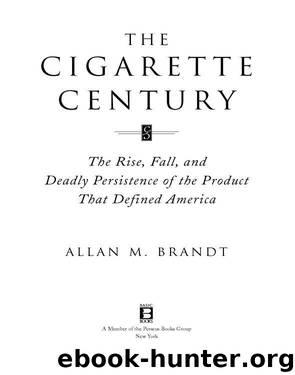The Cigarette Century by Allan Brandt

Author:Allan Brandt
Language: eng
Format: epub
Publisher: Basic Books
By the early 1980s, as product liability litigation came to be a common feature of American tort law, some legal analysts began to focus on the essential paradox that while tort law held American corporations to an increasingly high standard regarding the safety and toxicity of their products, the makers of cigarettes had never been successfully sued. Law professor Donald Garner, writing in 1980, noted that the tobacco industry had enjoyed “almost an imperial form of immunity,” turning back nearly three hundred lawsuits since the mid-1950s without a single award to any plaintiff. 21 Marc Edell would later conclude that the “cigarette manufacturers in the United States have enjoyed an immunity from liability far beyond the wildest dreams of any manufacturers.”22 Tobacco companies had worked diligently to secure this immunity through aggressive legal strategies, regulatory politics, and cultural influence. Ever since persuasive scientific data implicating cigarettes as a cause of disease had begun to emerge, the threat of product liability had hung over the industry. As a result, legal counsel had come to dominate every aspect of the industry’s strategic policy, from scientific research and product design to promotion, public relations, and the industry’s approach to regulation.23
When Edell took on Cipollone’s case, he was convinced that the important social and cultural shifts in public attitudes and knowledge about tobacco had created a “more receptive” legal climate to sue. In particular, he noted the accumulation of scientific and medical findings on both causation and addiction.24 Companies could no longer claim, as they had for a generation, that the links between smoking and disease were “not proven.” Straining credibility in this way was unlikely to inspire sympathy in a jury. Moreover, new scientific data demonstrating the addictiveness of nicotine undermined the notion of consumer “choice.” Edell concluded as well that the tobacco industry was vulnerable under new risk-utility provisions of New Jersey state tort law, which held that risky products must provide important advantages to consumers. Cars might be dangerous, but they offered significant personal and social benefits. Given the well-documented dangers of smoking and the few, if any, benefits, he believed the product was highly vulnerable under these provisions. Rose Cipollone, he would argue, had been convinced through fundamental misrepresentations to use a highly dangerous product with minimal, if any, utility.
Download
This site does not store any files on its server. We only index and link to content provided by other sites. Please contact the content providers to delete copyright contents if any and email us, we'll remove relevant links or contents immediately.
| Africa | Americas |
| Arctic & Antarctica | Asia |
| Australia & Oceania | Europe |
| Middle East | Russia |
| United States | World |
| Ancient Civilizations | Military |
| Historical Study & Educational Resources |
Cecilia; Or, Memoirs of an Heiress — Volume 1 by Fanny Burney(32558)
Cecilia; Or, Memoirs of an Heiress — Volume 2 by Fanny Burney(31956)
Cecilia; Or, Memoirs of an Heiress — Volume 3 by Fanny Burney(31942)
The Secret History by Donna Tartt(19092)
Sapiens: A Brief History of Humankind by Yuval Noah Harari(14390)
Leonardo da Vinci by Walter Isaacson(13337)
The Radium Girls by Kate Moore(12030)
Sapiens by Yuval Noah Harari(5372)
How Democracies Die by Steven Levitsky & Daniel Ziblatt(5219)
The Wind in My Hair by Masih Alinejad(5095)
Homo Deus: A Brief History of Tomorrow by Yuval Noah Harari(4919)
Endurance: Shackleton's Incredible Voyage by Alfred Lansing(4784)
Man's Search for Meaning by Viktor Frankl(4607)
The Silk Roads by Peter Frankopan(4535)
Millionaire: The Philanderer, Gambler, and Duelist Who Invented Modern Finance by Janet Gleeson(4479)
The Rape of Nanking by Iris Chang(4214)
Joan of Arc by Mary Gordon(4115)
The Motorcycle Diaries by Ernesto Che Guevara(4102)
Stalin by Stephen Kotkin(3969)
